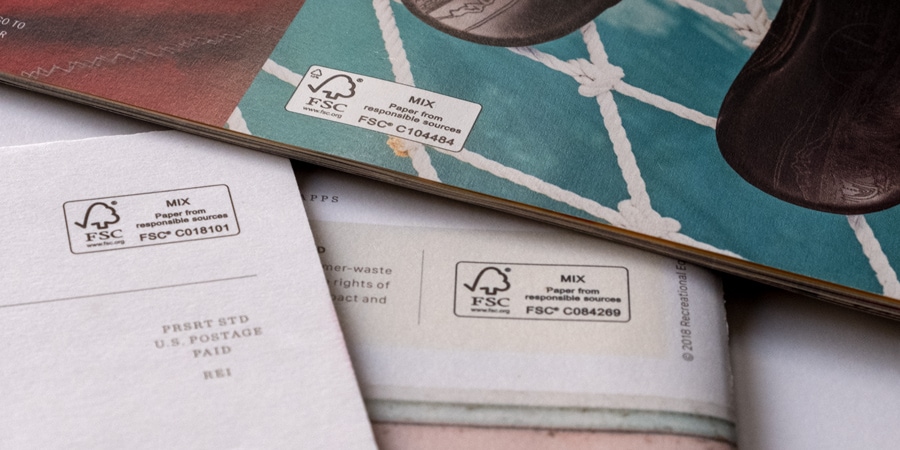Forests occupy a special niche in the heart of those who love the outdoors. In addition to their beauty and recreational value, forests play a critical role in the health of global ecosystems. Forests provide an important habitat for wildlife, promote clean water, prevent soil erosion and mitigate the effects of climate change by sequestering carbon dioxide from the atmosphere.
Forests also provide materials that are used in many everyday products. In addition to wood and paper, many other materials—including natural rubber and man-made cellulosic fibers such as lyocell and modal (used to make apparel and textile-based products)—also come from forests.
Forests that are managed responsibly can, in theory, provide these materials indefinitely. If the rate of harvesting these materials does not exceed the rate at which the forest can regenerate, and harvesting is done in a way that allows forests to continue to play their role in ecosystem health, then forests can be a reliable and sustainable source of raw materials.
Certifications exist to promote the responsible management of forests. Different certifying organizations take distinct approaches to promoting responsible forestry practices. One of the global leaders in responsible forestry is the Forest Stewardship Council, or FSC.
What Does FSC Certification Mean?

This environmental and social certification comes from the FSC, a global organization that certifies forests based on rigorous standards of responsible forest management. Certifications include "FSC 100%," "FSC Recycled" and "FSC Mix" (which can be a blend of FSC-certified, recycled and controlled sources). FSC certification applies to wood and wood-based products and covers a broad range of topics, including environmental stewardship, legal and regulatory compliance, social and economic well-being of workers, indigenous people's rights, and social and economic well-being of communities. You can find the FSC logo on both a product and its packaging.
One key aspect of FSC certification is tracking the "chain of custody" for a product: ensuring that the materials taken from sustainably managed forests reach you in the form of the final product without other materials getting accidentally mixed into the process.
How to Shop for FSC Certified Outdoor Products

At REI, outdoor-gear buyers can look for the FSC certification (and logo) on the following types of products:
- Wood-based gear, such as snowboards
- Products that contain natural rubber (derived from rubber trees), such as wetsuits
- Books and other paper-based products
Some clothing brands are also investigating FSC certification for wood-based cellulose fibers, such as lyocell, viscose and rayon. However, very few brands are selling any FSC-certified apparel yet, partly due to the complexity of apparel supply chains.
FSC also certifies when products contain recycled wood or paper, because using recycled materials reduces the burden on forests by alleviating the need to harvest new materials.
The following are FSC labels you might see:
- FSC 100%: Means all wood, paper and/or other wood-based materials within the product come completely from FSC-certified forests.
- FSC Recycled: Means all wood, paper and/or other wood-based materials in a product come from recycled or reclaimed (re-used) material.
- FSC Mix: Means all wood, paper and/or other wood-based materials within the product come from FSC-certified material, recycled material or controlled wood. "Controlled wood" minimizes the risk of using wood products from unacceptable sources, including wood that was harvested in forests where high conservation values are threatened by management, or from natural forests that were converted to non-forest uses.
To delve deeper into the FSC labels, read FSC Labels - Do You Know the Difference?.
FSC certification on packaging: Because so much of product packaging comes from wood-based materials, you will find the FSC logo on a wide range of items where the product itself isn't FSC-certified, but the packaging for that product is. Using FSC-certified materials in packing is still important to forest health, and it will often be found on products with other desirable sustainability attributes. To learn more about those, read How to Choose Sustainable Clothing and Gear.
REI Product Impact Standards
REI has established the REI Product Impact Standards, which apply to all brands and products sold at the co-op. These standards outline our expectations of all brands sold at REI regarding how key environmental, social and animal welfare impacts are managed. The standards also identify preferred attributes—the most credible, relevant and impactful features that support positive impacts across our product offering. We encourage brand partners to use for their products, including standards covered in this article. Look for products with these features while shopping at REI to help support better ways of making gear.
